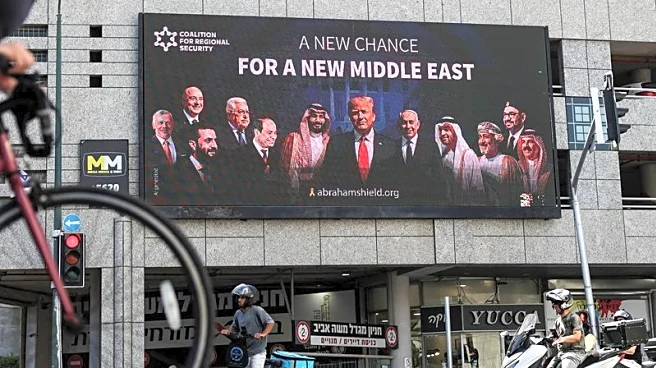DUBAI (Reuters) -The Abraham Accords, which normalised diplomatic relations between Israel and some Arab states, are under the spotlight after Israel attacked Hamas on September 9 with airstrikes on Qatar,
outraging the U.S. ally that has hosted ceasefire talks.
Leaders of Arab and Islamic states are meeting at a summit in Qatar on Monday to show solidarity.
Here are some facts on the Abraham Accords.
WHO SIGNED THEM AND WHAT DID THEY ACHIEVE?
The Abraham Accords are a set of agreements to normalise relations with Israel. The United Arab Emirates and Bahrain signed during U.S. President Donald Trump's first term in 2020, breaking a longstanding taboo to become the first Arab states to recognise Israel in a quarter century. Morocco and Sudan followed suit.
Jared Kushner, the son-in-law of Trump, helped broker the accords.
Palestinian officials said they felt betrayed by their Arab brethren for reaching deals with Israel without first demanding progress toward the creation of a Palestinian state.
The biggest prize in the accords for Israel was the agreement with the United Arab Emirates, a major global oil producer and commercial and trade hub with diplomatic clout across the Middle East.
Israel and the UAE have since developed close economic and security ties, including defence cooperation and a free trade pact. But ties have been strained lately.
The United Arab Emirates warned Israel this month that annexation in the occupied West Bank would constitute a red line that would severely undermine the spirit of the accords, after a far-right Israeli minister vowed to bury the idea of a Palestinian state with settlement building.
WHAT IS THE FUTURE OF THE AGREEMENTS?
Washington has long held out hope that momentum in areas such as trade, commerce and investment would lead to the accords being extended to other Arab states, above all regional powerhouse Saudi Arabia, the richest of them all.
But Riyadh has insisted there can be no normalisation with Israel without a clear path to the creation of a Palestinian state, which the most far-right government in Israel's history rejects.
Since Hamas militants attacked Israel in October 2023, precipitating a war in which Israel killed tens of thousands of Palestinians in Gaza, Arab states have grown more estranged from Israel and public opinion in Arab countries has become angrier.
Still, under both former President Joe Biden and Trump since his return to office this year, Washington has promoted wider Arab recognition of Israel as a key eventual goal in any future regional settlement to end the war.
Trump said last month that it was important that more Middle Eastern countries join the Abraham Accords, saying it would ensure peace in the region.
Trump's administration is discussing with Azerbaijan the possibility of bringing that mainly Muslim nation into the accords, along with some Central Asian allies, to deepen their ties with Israel, according to five sources with knowledge of the matter.
(Writing by Michael GeorgyEditing by Peter Graff)









